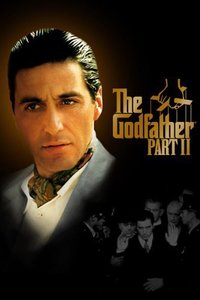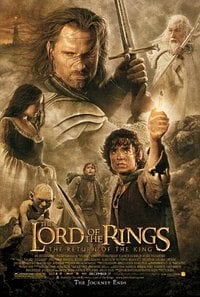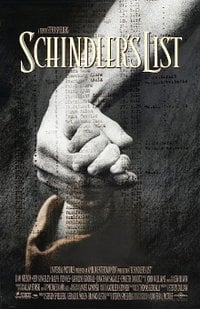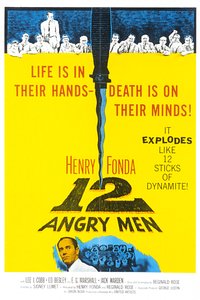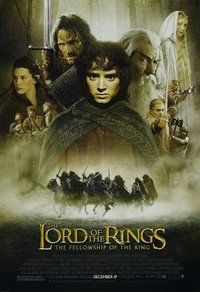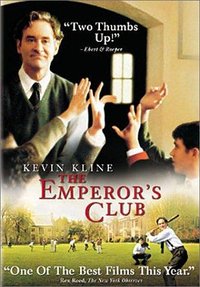
The Emperor's Club Quotes
An idealistic prep school teacher attempts to redeem an incorrigible student.
Older Deepak Mehta: A great teacher has little external history to record. His life goes over into other lives. These men are pillars in the intimate structure of our schools. They are more essential than its stones or beams, and they will continue to be a kindling force and a revealing power in our lives.
William Hundert: Excuse me?
Louis Masoudi: Huh? What me?
William Hundert: Yes, sir. What is your name?
Louis Masoudi: Uh, Louis.
William Hundert: Just Louis?
Louis Masoudi: Louis Masoudi, sir.
William Hundert: Mr. Masoudi, could you define the word "path" for me?
Louis Masoudi: Well, there are several definitions, I suppose.
William Hundert: Would "a route along which someone or something moves" be among them?
Louis Masoudi: Yeah. Oh, yeah. No. Yeah. I'm s-sorry, sir.
William Hundert: Follow the path, Mr. Masoudi. Walk where the great men before you have walked.
Louis Masoudi: Yes, sir. It's, uh - It's better for the grass.
William Hundert: It's better for you.
Louis Masoudi: Huh? What me?
William Hundert: Yes, sir. What is your name?
Louis Masoudi: Uh, Louis.
William Hundert: Just Louis?
Louis Masoudi: Louis Masoudi, sir.
William Hundert: Mr. Masoudi, could you define the word "path" for me?
Louis Masoudi: Well, there are several definitions, I suppose.
William Hundert: Would "a route along which someone or something moves" be among them?
Louis Masoudi: Yeah. Oh, yeah. No. Yeah. I'm s-sorry, sir.
William Hundert: Follow the path, Mr. Masoudi. Walk where the great men before you have walked.
Louis Masoudi: Yes, sir. It's, uh - It's better for the grass.
William Hundert: It's better for you.
William Hundert: Sir, it's my job to mold your son's character, and I think if...
Senator Bell: Mold him? Jesus God in Heaven, son. You're not gonna mold my boy. Your job is to teach my son. You teach him his times tables. Teach him why the world is round. Teach him who killed who and when and where. That is your job. You, sir, will not mold by son. I will mold him.
Senator Bell: Mold him? Jesus God in Heaven, son. You're not gonna mold my boy. Your job is to teach my son. You teach him his times tables. Teach him why the world is round. Teach him who killed who and when and where. That is your job. You, sir, will not mold by son. I will mold him.
[first lines]
Valet: Is everything okay, sir?
William Hundert: Fine, thank you. Here.
[reaches into his pocket]
William Hundert: Let me, uh...
Valet: That's not necessary, sir.
[walks away]
William Hundert: [narrating] As I've gotten older, I realize I'm certain of only two things. Days that begin with rowing on a lake are better than days that do not. Second, a man's character is his fate. And as a student of history, I find this hard to refute. For most of us our stories can be written long before we die. There are exceptions among the great men of history, but they are rare, and I am not one of them. I am a teacher - simply that. I taught for 34 years. One day I stopped teaching. Those were the facts of my life's chronicle. The last chapter had been written. My book was closed.
Valet: Is everything okay, sir?
William Hundert: Fine, thank you. Here.
[reaches into his pocket]
William Hundert: Let me, uh...
Valet: That's not necessary, sir.
[walks away]
William Hundert: [narrating] As I've gotten older, I realize I'm certain of only two things. Days that begin with rowing on a lake are better than days that do not. Second, a man's character is his fate. And as a student of history, I find this hard to refute. For most of us our stories can be written long before we die. There are exceptions among the great men of history, but they are rare, and I am not one of them. I am a teacher - simply that. I taught for 34 years. One day I stopped teaching. Those were the facts of my life's chronicle. The last chapter had been written. My book was closed.
William Hundert: Well... Senator... The Greeks and the Romans provided a model of democracy, which I don't need to tell you, the framers of our own constitution, used as their inspiration. But more to the point I would think when the boys read Plato, Aristotle, Cicero, Julius Caesar even, they're put in direct contact with men, who in their own age, exemplified the highest standards of statesmanship, of civic virtue, character, conviction.
William Hundert: I'm a teacher, Sedgewick. And I failed you - as a teacher. But I will give you one last lecture, if I may. All of us, at some point, are forced to look at ourselves in the mirror, and see who we really are. And when that day comes for you, Sedgewick, you will be confronted with a life lived without virtue, without principle. And for that I pity you. End of lesson.
Sedgewick Bell: Well, can I say, Mr. Hundert, who gives a shit? Honestly. Who out there gives a shit.
Sedgewick Bell: Well, can I say, Mr. Hundert, who gives a shit? Honestly. Who out there gives a shit.
William Hundert: I spoke to your father.
Sedgewick Bell: I know. We had a real... heart-to-heart.
William Hundert: This is for you.
[Hands textbook to Sedgwick]
William Hundert: Forgive the condition. It was my textbook in high school. It's quite good. The first chapter has an outline of all the material which we'll be covering this term. I thought it might be helpful in preparing for the Mr. Julius Caesar contest. The first quiz is tomorrow morning. Look at chapter 3 - - "The Foundation of the Republic." Sedgwick, I'm lending you this book because I believe in you. I think you could be at the top of your class if you wanted to be. It's entirely up to you.
Sedgewick Bell: I know. We had a real... heart-to-heart.
William Hundert: This is for you.
[Hands textbook to Sedgwick]
William Hundert: Forgive the condition. It was my textbook in high school. It's quite good. The first chapter has an outline of all the material which we'll be covering this term. I thought it might be helpful in preparing for the Mr. Julius Caesar contest. The first quiz is tomorrow morning. Look at chapter 3 - - "The Foundation of the Republic." Sedgwick, I'm lending you this book because I believe in you. I think you could be at the top of your class if you wanted to be. It's entirely up to you.
William Hundert: [teaching] And with the monarchy's demise, two new systems of government - the first, ruled by the few, known as? Mr. Brewster.
Robert Brewster: Uh, tyranny?
William Hundert: In spirit, perhaps, but etymologically, no. More precisely, oligarchy. Tyranny is what we have in this classroom. And it works.
[laughter]
Robert Brewster: Uh, tyranny?
William Hundert: In spirit, perhaps, but etymologically, no. More precisely, oligarchy. Tyranny is what we have in this classroom. And it works.
[laughter]
Senator Bell: Let me ask you something, do you know what is causing me to send you to this place?
Sedgewick Bell: What's wrong?
Senator Bell: Shut up. My time is precious son. I thought I made that clear. I got better things to do than clean up after you, do you understand me?
Sedgewick Bell: Yes, sir. Yes, sir. I understand.
Senator Bell: Don't forget it.
[pause and then he hangs up the phone]
Sedgewick Bell: What's wrong?
Senator Bell: Shut up. My time is precious son. I thought I made that clear. I got better things to do than clean up after you, do you understand me?
Sedgewick Bell: Yes, sir. Yes, sir. I understand.
Senator Bell: Don't forget it.
[pause and then he hangs up the phone]
William Hundert: [discussing 41 specific emperors] Can you, please, name any of the subsequent emperor's whom we've been discussing? There were 41.
Sedgewick Bell: I only know 7.
William Hundert: Very well...
Sedgewick Bell: Grumpy, Happy, Sleepy, Sneezy, Dopey...
William Hundert: Seriously though, can you in fact name any of the emperors?
Sedgewick Bell: I know 4.
William Hundert: Very well.
Sedgewick Bell: [in an English accent, counting off his fingers] John, Paul, Ringo
[closes all but the middle finger]
Sedgewick Bell: and George.
Sedgewick Bell: I only know 7.
William Hundert: Very well...
Sedgewick Bell: Grumpy, Happy, Sleepy, Sneezy, Dopey...
William Hundert: Seriously though, can you in fact name any of the emperors?
Sedgewick Bell: I know 4.
William Hundert: Very well.
Sedgewick Bell: [in an English accent, counting off his fingers] John, Paul, Ringo
[closes all but the middle finger]
Sedgewick Bell: and George.


